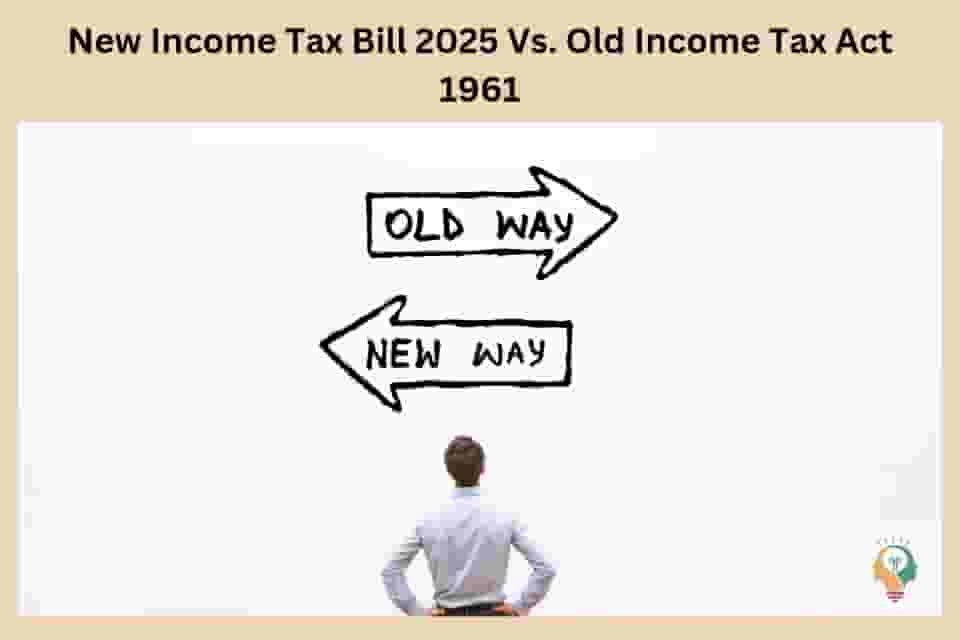New Income Tax Bill 2025 Vs. Old Income Tax Act 1961
Updated: 09-10-2025 at 4:59 AM
1k


The most awaited announcement that every citizen of India was waiting for is finally here. The Finance Minister of India, Smt Nirmala Sitharaman announced the particulars and specifics of the New Income Tax Bill of 2025 in the parliament on February 13th.
The New Income Tax Bill 2025 is an updated version of the old Income Tax Act of 1961 with new measures and time-relevant and sensitive provisions. The New Bill has removed many unnecessary and complex terms that were used in the Old Act to make the rules and regulations easy for the people of India to understand.
The New Bill also emphasises digital recordkeeping and working, which is convenient, efficient, and quick compared to traditional paper-based methods. The New Income Bill 2025 covers all the loopholes of the old Income Tax Act of 1961, ranging from taxation for Non-Profit Organisations (NGOs) to residency status.
Read the article to know what major provisions have been added to the New Income Tax Bill and the difference between the New Bill and the Old Income Tax Act.
New Income Tax Bill 2025 Vs. Old Income Tax Act 1961
There are considerable changes in the New Income Tax Bill 2025 and the old Income Tax Act of 1961. Please read the following points to understand what exactly those changes are and how the new and old bills differ:
1. Tax Year
As per Clause 2, a new term has been added to the New Bill. i.e. Tax Year. Tax Year is defined as a ‘Financial year beginning on the 1st day of April and ending on the 31st day of March of the following year’. The newly added term replaces the old terms like ‘previous year’ or ‘assessment year’ that were mentioned in the old Income Tax Act of 1961.
2. Residential Status
According to Section 6 of the new bill, an expression concerning individuals who leave for employment purposes has been changed from ‘for the purpose of employment’ to ‘for employment outside India’. This has been done to increase clarity in statements.
3. Taxation Of NGOs/NPOs
A new and unified taxation system has been devised for Non-Profit Organisations (NPOs), and Non-Government Organisations (NGOs). The new taxation system comprises over 20 provisions that cover all the essential requirements ranging from application for registration to taxation of income.
Non-Profit Organisations (NPOs) replace the word ‘trusts’ used in the old act and the new taxation system is expected to prove to be effective for the taxation of NGOs/NPOs.
4. Salary Deductions
In the Old Act, entertainment allowance used to be deducted from the salaries of the govt employees but under the New Bill, this has been removed.
5. Business’s Income
In the Old Act, there were several different sections like Section 30 for deductions for revenue expenses of a business entity and Section 31 for deductions for repairs, and insurances of machinery, plant, or furniture. In the New Bill, these sections have been combined for fair deductions.
6. Capital Gains
As per the old Income Tax Act of 1961, Section 47 was dedicated to a list of transactions exempted from transfers of land for capital gain. However, in the New Bill, these clauses have been removed.
7. Income From Other Sources
In the Old Act, gifts received from lineal ascendants/descendants were free from taxation but there was no clarity regarding the relationships being maternal/paternal. The New Act has mentioned that lineal ascendants/descendants can be maternal or paternal.
8. Clubbing Of Income
Previously, in order to club spouse’s income, technical or professional qualifications were mandated but now, this rule has been removed.
9. Deductions & Relief
In the Old Act, deductions were not mentioned in an organised manner but the New Bill 2025 has proposed to merge the sections of deductions. i.e. Sections 80TTA and 80TTB in one category, Section 80C will now be in Schedule 15.
10. Tax Rates
Under the new system freedom has been valued and hence, domestic companies and resident cooperative societies are now allowed to choose the alternative tax regime. Also, the Central Board of Direct Taxes (CBDT) has been given the authority to oversee several functions.
11. TDS & TCS
The New Income Tax Bill has expanded the coverage limit of Tax Deducted at Source (TDS) and Tax Collected at Source (TDC).
12. Penalties & Prosecution
The New Income Tax Bill has removed the requirement of mandatory hearings for some kind of penalties. The bill also proposed that prosecution under clause 476 should be a non-cognisable offence.
13. Search & Seizure
In the Old Act, when it comes to search and seizure, the focus was limited to physical books and documents but now under the New Bill, the focus area has been expanded to digital media as well.
Conclusion
The New Income Tax Bill of 2025 is finally here and the provisions that it came with would improve the working of the taxation system and the lives of people. It is one of the most long-awaited updates that the country needs.
Stay updated with Jaagruk Bharat to get the latest information on government schemes and more, and reach out to us via our community page if you have any questions or you wanna share your thoughts.
0
0
1k
0
0
1k Views
0
No comments available





Our Company
Home
About
T&C
Privacy Policy
Eula
Disclaimer Policy
Code of Ethics
Contact Us
Cancellation & Refund Policy
Categories
Women
Insurance
Finance
Tax
Travel
Transport & Infrastructure
Food
Entertainment
Communication
Government ID Cards
E-commerce
Traffic guidelines
Miscellaneous
Housing and Sanitation
Sports
Startup
Environment and Safety
Education
Agriculture
Social cause
Employment
Disclaimer: Jaagruk Bharat is a private organization offering support for documentation and government scheme access. We are not affiliated with any government body. Official services are available on respective government portals. Our goal is to make processes easier and more accessible for citizens.
All Copyrights are reserved by Jaagruk Bharat